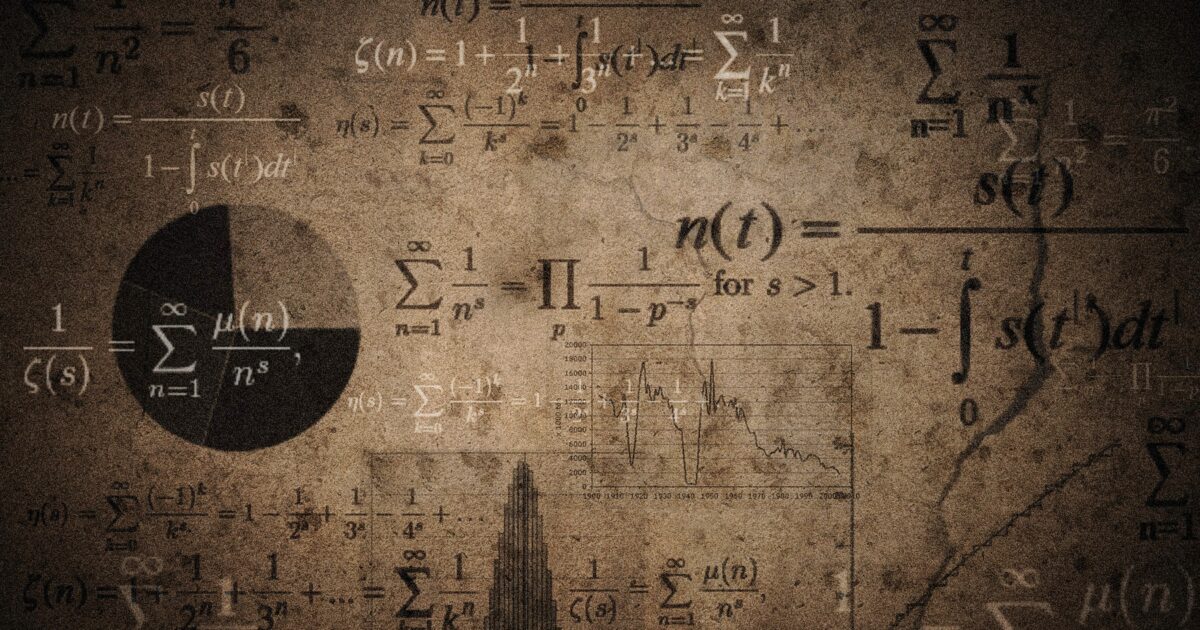 Faith & Science
Faith & Science
Mathematics and the God Hypothesis

In a recent post, atheist biologist Jerry Coyne takes issue with a commenter who asserts that God exists in the same sort of way mathematics exists. Here’s the analogy the commenter offered, as quoted by Coyne:
Think of numbers for example, or mathematical equations, these are metaphysical things, that have not been created, however were discovered. The number 7 was the number 7 before anything at all came into existence. This is also true concerning the nature of God. He is not some material being that has come into existence, he is like a number that has always existed, (and by the way nobody will deny this logic with the number, however when someone mentions God a problem occurs).
JERRY COYNE, “A NEW CONCEPTION OF GOD: HE’S REAL IN THE WAY MATHEMATICS IS” AT WHY EVOLUTION IS TRUE (JULY 20, 2022)
Coyne who — as you might guess — is unimpressed by this approach to demonstrating God’s existence, replies:
The problem is that we can manipulate numbers and use them to arrive at truths, while we can’t do the same with our conception of God, which remains a Platonic ideal. The only way to manipulate this Platonic God is to answer detractors that demand evidence by saying, “Give me evidence that the number 7 actually exists as an empirical entity.”
Although it’s clear that this kind of god does not correspond in any way to the theistic God believed by many faiths, including Abrahamic ones, it’s a conception of God that’s been confected simply to avoid the questions “What was there before God?” and “Who created God?” It finesses the question by assertion that God is like the number 7 to mathematical realists. But in fact it does make an assertion about God: that he has an objective reality, which is why he resembles numbers to mathematical realists. Just as mathematical realists can’t prove that numbers are actual entities existing out there, so “Defender” can’t prove that God is an actual entity existing somewhere.
JERRY COYNE, “A NEW CONCEPTION OF GOD: HE’S REAL IN THE WAY MATHEMATICS IS” AT WHY EVOLUTION IS TRUE (JULY 20, 2022)
The commenter did not intend to prove God’s existence using mathematics. He merely pointed out that God’s existence is analogous, in limited ways, to the existence of numbers — they, like God, are immaterial, real, and eternal. Which, of course, is true. And Coyne will have none of it.
The Augustinian Proof
There is, in fact, a classical proof of God’s existence that uses universal concepts such as mathematics, proposed most prominently by St. Augustine (354–430 CE) of Hippo in the 4th century AD. It’s sometimes called the Augustinian Proof. I find it quite compelling and it goes like this:
Two kinds of things exist in the natural world: particulars and universals. Particulars are specific material things we know by our senses — a rock, a tree, my neighbor Joe, etc. Universals are abstract concepts that we know in the sense that we can contemplate them and talk about them — geology, botany, humanity, etc. But we cannot know any of these abstractions by our senses alone. We know abstractions by our intellect, which is our capacity for abstract thought.
Mathematics is an archetype of universals — take, for example, the set of natural numbers. It includes all counting numbers — 1, 2, 3, 4 and so on. There has been some debate among philosophers and mathematicians about the reality of numbers (i.e., do they exist in a separate Platonic realm, or only in the human mind, or do they have no existence at all — in other words, are they are merely words?). This is a profound question, but the view that natural numbers (and other universals) do exist in reality in some fashion is very hard to deny.
For example, consider the formation of our solar system. It formed around one sun, not two or three or a million suns — and it formed before there was any human mind to count the suns. But it is surely just as true that our solar system had one sun a billion years ago as it is true now. So the number 1 really exists in some fashion independent of the human mind. The same could be said of any number. For example, we know the ratios of many physical constants of the universe that have existed since the Big Bang, and because these ratios are real (we can measure them) then the numbers the ratios represent are real.
The Realm of Forms
So how could numbers exist in reality, independent of the human mind? Plato proposed a realm of Forms in which universals exist, and in which our concepts participate. There are notorious problems with Plato’s concept of the realm of Forms (philosopher Edward Feser has a good discussion of this). But it seems undeniable that universals (such as numbers) do really exist in some real sense.
The solution proposed by Augustine (and many other philosophers and theologians, most notably Gottfried Wilhelm Leibniz) is called scholastic realism. Scholastic realism posits that God’s Mind is the Platonic realm of Forms. Augustine proposed that universals such as numbers, mathematics in general, propositions, logic, necessities, and possibilities exist in the Divine Intellect, which is infinite and eternal.
What’s remarkable about the reality of universals as proof for God’s existence is that it points in a simple and clear way to some of God’s attributes, such as infinity, eternity, and omnipotence.
Read the rest at Mind Matters News, published by Discovery Institute’s Bradley Center for Natural and Artificial Intelligence.
